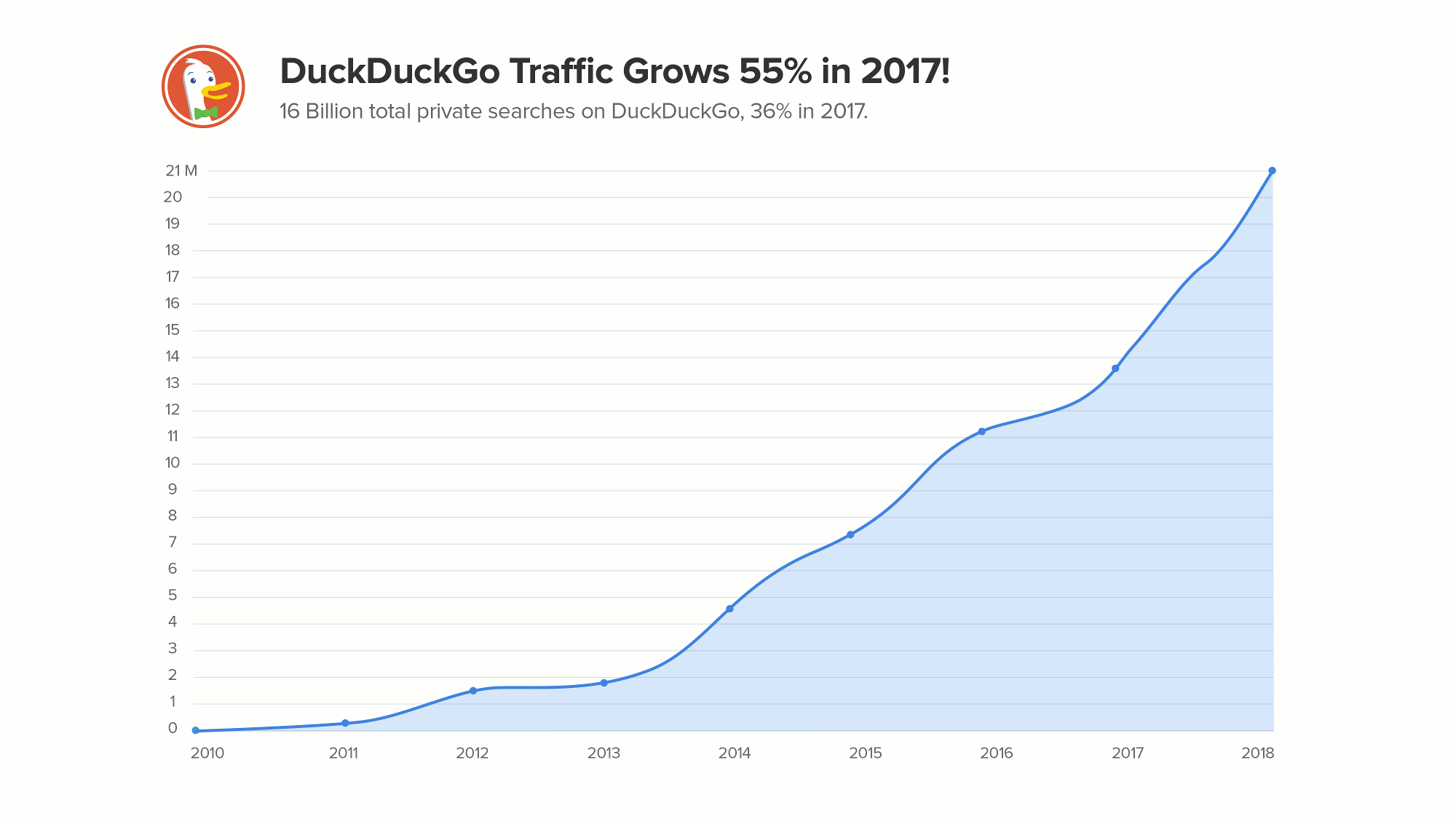How Many People Use DuckDuckGo?
If you’re unfamiliar with DuckDuckGo, we are an Internet privacy company that empowers you to seamlessly take control of your personal information online, without any tradeoffs. We operate a search engine alternative to Google at https://duckduckgo.com, and offer additional apps and extensions to protect you from Google, Facebook and other trackers, no matter where you go on the Internet.
You may find it surprising to learn that we don’t know how many people use DuckDuckGo! It makes sense though when you take a look at our Privacy Policy – we don’t collect or share personal data, including linking searches to individuals – and so we simply have no way to accurately count people, even anonymously. We can, however, make an educated guess.
The Numbers Today
Since we do not track users, it’s impossible for us to know exactly how many users visit our site every month, though we are able to make an educated guess based on the number of searches we get per month. You might be wondering: how can we count searches without tracking people? Since searches are not tied to individuals and are therefore anonymous, we do not know who is making these searches, only that they occurred.
We can use our monthly search count to estimate how many people use DuckDuckGo by dividing the total by the average number of searches per person done on other search engines that do track their users. The monthly average is about 30 searches per person, or one per day on average. Of course, some people search way more and some way less; that is, the variance is high, but that is the reported average.
In any case, if you use those numbers, it works out to approximately 80 million people (as of November 2020)!
Privacy is Mainstream
This large number helps show that if you too want more online privacy, you are not alone. In a survey we commissioned of US adults at the end of 2017, we found that about one quarter of the population cares deeply enough about their online privacy to take significant actions to try to protect it, such as using DuckDuckGo. With increasingly invasive advertising, devastating data breaches, and ramping up regulatory focus, the fact that almost a quarter of the population responded this way should no longer come as a shock. Privacy is not niche – it is mainstream!
In March 2018, after Cambridge Analytica was able to easily download the sensitive personal information of about 90 million Facebook users, we ran another survey to gauge how this incident impacted the public’s awareness of the need for greater privacy online. Roughly half (51.12% +/- 3.12%) of those polled who were aware of the Cambridge Analytica incident were more likely to seek out tools and services to protect their online privacy.
In other words, the segment of the population who cares about protecting their privacy online and who is actively taking actions to protect it, is also growing rapidly. The nearly daily reminders that personal information isn't safe online has made privacy top of mindamong mainstream audiences, bringing more and more people to DuckDuckGo in search of peace of mind.
Reflecting on these changes in public attitude, at the start of 2018 we proudly announced that we grew 55% in 2017, crossing 20 million private searches per day, and we continue to grow.

More Education is Needed
Our mission is to set a new standard of trust online through the privacy tools DuckDuckGo provides – our anonymous search engine at https://duckduckgo.com and our apps and extensions that protect your privacy while browsing the web.
Despite increased awareness of privacy issues and actions people can take, there are sadly still many people putting their privacy at risk, or, browsing with a false sense of privacy. This happens for a variety of reasons, including practices such as relying solely on the Do Not Track browsing setting or so-called “Incognito” mode, neither of which do much to protect your privacy while searching or browsing.
To help correct these misconceptions and reach more people, we’re also trying to educate users through our blog, social media and a privacy “crash course” newsletter.
The Internet shouldn't feel so creepy and getting the privacy you deserve online should be as simple as closing the blinds.
For more privacy advice follow us on Twitter, and stay protected and informed with our privacy newsletters.
